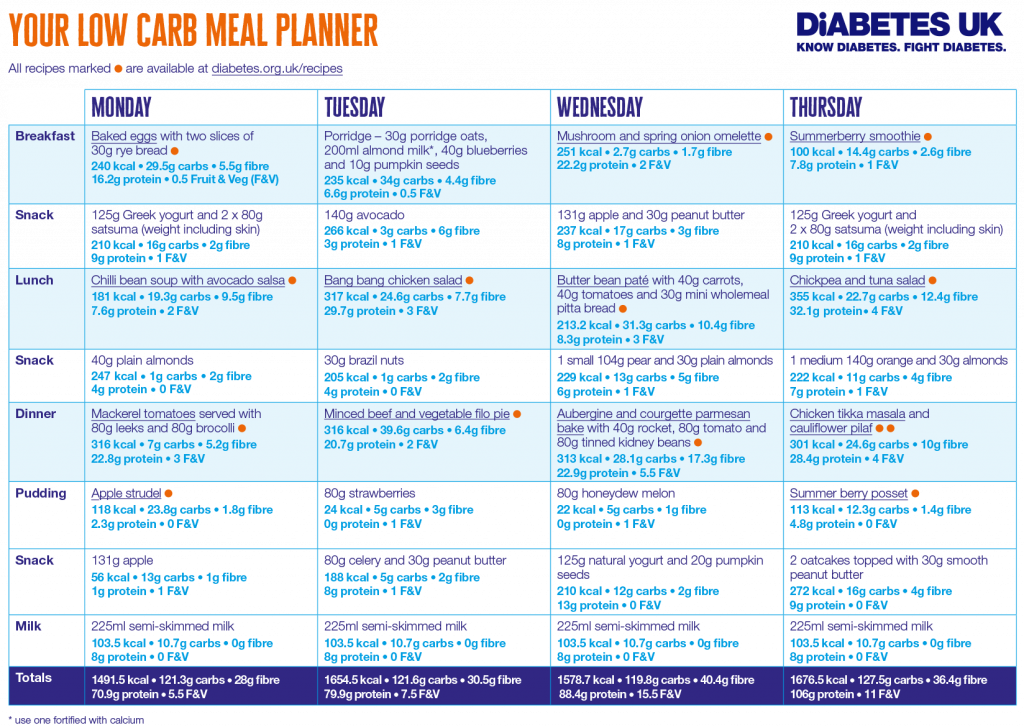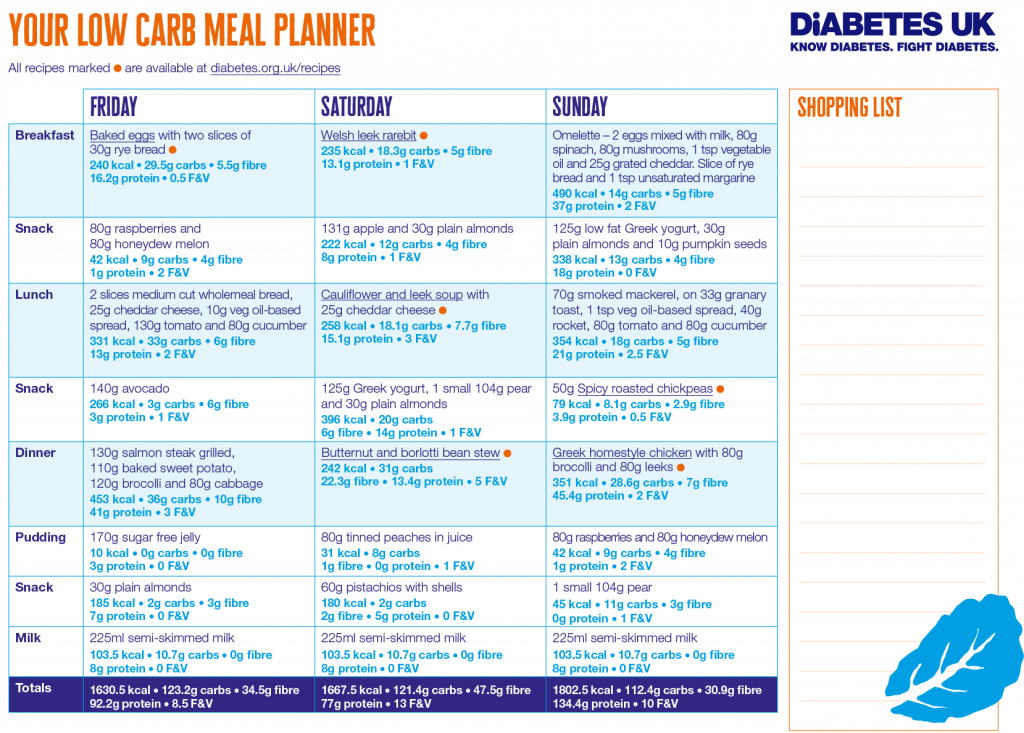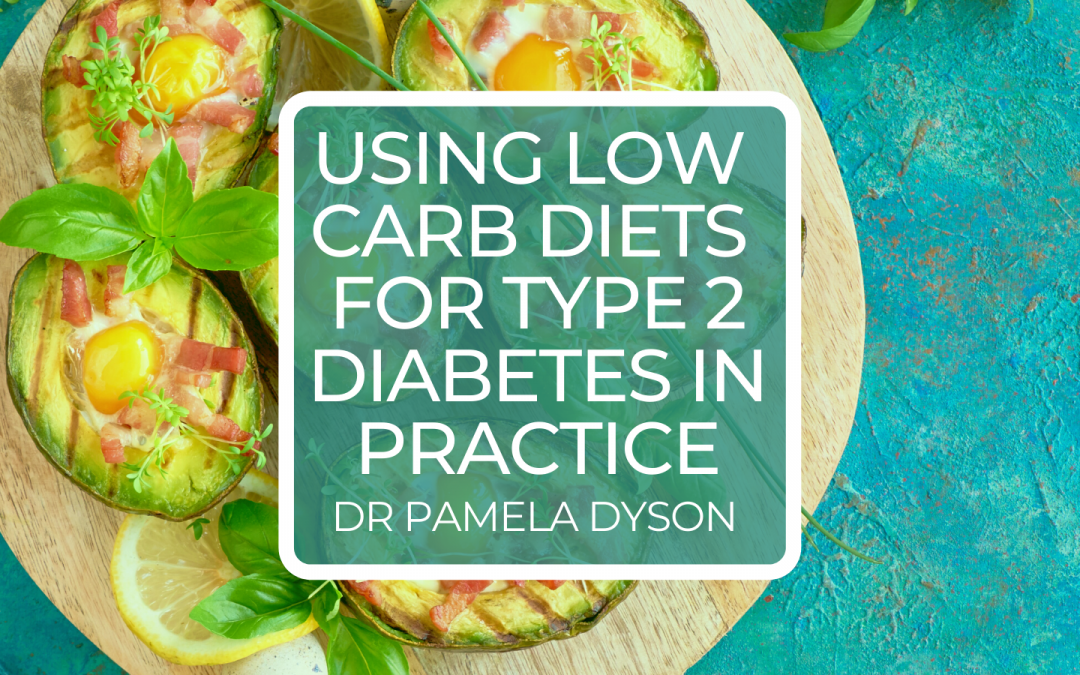It’s important that healthcare professionals working in the field of diabetes are well supported to help give practical advice to patients that choose to adopt a lower carbohydrate diet. For World Diabetes Day 2021 we’ve invited Dr Pamela Dyson RD (SACN joint working group member) to summarise key practice points recommended in SACN’s report ‘Lower Carbohydrate Diets for Type 2 Diabetes‘ published earlier this year.
 About the author: Pam Dyson PhD Registered Dietitian has been interested in the subject of low carbohydrate diets and type 2 diabetes since 2005, when she began a series of studies investigating their effect on body weight, glycaemic control and cardiovascular disease (CVD) risk. She has maintained interest over the years and was elected to represent the British Dietetic Association on the recent SACN working group investigating low carb diets and type 2 diabetes. She designed the low energy, low carb intervention for the DIAMOND pilot study (Dietary Approaches to the Management of Type 2 Diabetes), which showed a positive effect in people with type 2 diabetes, and is now involved with the larger Diamond RCT. In addition to her SACN role at Public Health England she works at OCDEM, Oxford University NHS Foundation Trust and NIHR Biomedical Research Centre, Oxford.
About the author: Pam Dyson PhD Registered Dietitian has been interested in the subject of low carbohydrate diets and type 2 diabetes since 2005, when she began a series of studies investigating their effect on body weight, glycaemic control and cardiovascular disease (CVD) risk. She has maintained interest over the years and was elected to represent the British Dietetic Association on the recent SACN working group investigating low carb diets and type 2 diabetes. She designed the low energy, low carb intervention for the DIAMOND pilot study (Dietary Approaches to the Management of Type 2 Diabetes), which showed a positive effect in people with type 2 diabetes, and is now involved with the larger Diamond RCT. In addition to her SACN role at Public Health England she works at OCDEM, Oxford University NHS Foundation Trust and NIHR Biomedical Research Centre, Oxford.
Low Carb Diets for Diabetes
Low carb diets have been in the news over the past few years, with both people living with type 2 diabetes and diabetes professionals alike proclaiming them the best thing since sliced bread (or perhaps not!). The publication of the SACN report evaluating low carb diets and type 2 diabetes in May 2021 (1) stated that these diets appear safe and effective for clinical use, although it is important to note that they were not any more eff ective than other strategies such as low fat ‘healthy eating’, low energy diets, very low energy diets and Mediterranean diets over periods greater than six months. In addition, the evidence supporting these diets applies only to those with type 2 diabetes living with overweight and obesity.
ective than other strategies such as low fat ‘healthy eating’, low energy diets, very low energy diets and Mediterranean diets over periods greater than six months. In addition, the evidence supporting these diets applies only to those with type 2 diabetes living with overweight and obesity.
Practical Point 1: Offering a variety of dietary strategies
There are a variety of dietary strategies that are effective for weight loss, improving glycaemic control and reducing cardiovascular disease (CVD) risk in people with type 2 diabetes. In line with the advice offered by Diabetes UK, it is recommended that the person living with diabetes selects the most appropriate strategy for themselves. In Oxford, we run weight management groups specifically for those with diabetes where we offer a variety of different strategies, including low carb diets, and then support people with the choice they have made. However, many diabetes professionals, including dietitians, who wish to support those with type 2 diabetes who would like to adopt a low carb diet are at something of a loss about what a low carb diet is and where to go for resources.
Practical Point 2: Defining a low carb diet
Unfortunately, there is no general consensus about what a low carb diet actually is. Most people now adopt the definition of low carb as 50-130g/day (1), but in the majority of studies that have been done, only 5 out of 43 (12%) RCTs actually used a low carb diet, and the majority (67%) prescribed a more moderate carb intake of 130-230g/day. One argument is that a more severe restriction like that seen in very low carb diets (<50g/day) would be more effective, but although there have been studies investigating this, the results were not any better than studies with higher carb intakes (2). There are, of course, issues with adherence (as is the case in most dietary interventions) and most studies report a general shift to higher carb intakes over time. At present, the general agreement is that low carb diets should be designed to provide 50-130g/day.
Practical Point 3: Characteristics of low carb diets
The guiding principle of low carb diets is to avoid all starchy and sugary foods, including foods that are often promoted as health-giving e.g. wholegrain cereal products (bread, cereals and pasta), brown rice, legumes and pulses and some fruit. Simple diet sheets promoting the low carb approach often list carb-rich foods with the suggestion that these should be completely avoided and then list low carbohydrate foods that can be eaten at will – e.g. all animal protein foods (meat, fish, eggs, cheese), green leafy veg, and all fats and oils. Concerns have been expressed about the nutritional quality of a diet that is low in cereal fibre and high in saturated fat, although it should be pointed out that there was no evidence of increased risk of CVD in the studies investigating low carb diets and there is little evidence of nutritional deficiencies (1).
Practical Point 4: How to reduce carb intake to 50-130g/day
Avoiding all sugary and highly processed starchy foods, including:
- Any food containing free sugars e.g. cakes, biscuits, confectionery, chocolate, jams, marmalade, honey, syrup, puddings, desserts, ice cream, sugar sweetened beverages, fruit juices and smoothies
- Processed starchy food e.g. white bread, processed or sugar-sweetened breakfast cereals, white rice, white pasta and anything made with white flour
Including small amounts of foods containing natural sugars and those high in dietary fibre:
-
- Whole fruit, especially lower carb fruits e.g. berries, citrus fruits, stone fruits and melon
- Milk and natural yogurt
- Some vegetables including carrots, sweetcorn
- All pulses and legumes
- High fibre or wholegrain cereal e.g. wholegrain breakfast cereal, wholegrain bread, wholewheat pasta
Practical Point 5: Maintaining healthy eating
For many years ‘healthy eating’ has been associated with a reduction in fat (especially saturated fat) intakes, promotion of high fibre, unprocessed carbohydrate foods and high intakes of fruit and veg. Low carb diets appear to contradict this message, and it’s certainly true that there is an emphasis on reducing carb intake and fruit, but low carb diets don’t necessarily mean a diet of bacon and beef. We have produced a low carb diet sheet in Oxford that promotes both Mediterranean-style eating and a low carb approach and we have done this by advising complete avoidance of sugary, processed carb foods and recommending high intakes of green leafy and salad vegetables, using olive oil in place of saturated fat, including moderate amounts of fish, seafood, poultry and fermented dairy products (natural yogurt and cheese) and low intakes of red meat and most refined or highly processed foods.
Practical Point 6: Where to go for resources
- The Diabetes UK website provides information about low carbohydrate diets with general information and a seven day meal plan with recipes (3).


- The Low Carb Programme (4) comprises a 12-week structured behavioural change programme specifically designed for people with type 2 diabetes. It is QISMET approved, has received a CE Mark (meaning that it is registered with the MHRA) and has been sanctioned by NHS digital. It is available as an app on iOS or Android and can be downloaded from the Apple Store or Google Play. There is a cost associated with this programme; at present it costs £13.99 per month or £69.99 per year.
- A low carb diet sheet adopting all the principles above can be found at an upcoming article in Diabetic Medicine, due to be published soon.
Practical Point 7: Medication adjustment
Reducing carbs in those taking either sulfonylureas or insulin can lead to hypoglycaemia, so proactive medication adjustment and monitoring are required. There are no formal, evidence-based guidelines available for medication adjustment, although physicians working in this area have produced useful algorithm for medication adjustment before starting a low carbohydrate diet (5).
Summary
There is no consensus on the definition of a low carb diet, but general agreement that they should provide 50-130g carbohydrate/day. Evidence suggests that low carb diets are more beneficial over the short term (up to 6 months) for improvements in HbA1c, fasting blood glucose and triglycerides, but that these benefits are not maintained over the longer term. Using low carb diets in practice usually means avoiding all sugary and refined or processed carbohydrate foods and limiting fruit, milk and wholegrains . Adopting a Mediterranean-style low carb diet can support healthy eating. Resources for low carb diets, including web-sites and diet sheets are available.
Related MyNutriWeb Content
Type 2 Diabetes in Children and Young People: Practical Dietary Approaches (Upcoming – 10th Nov 2021) – 60 min CPD webinar with Kate Henson
Low Carb Diet: Latest Evidence and Practice (2021) – 60min webinar CPD with Douglas and supporting Resource Blog
Nutrition, Diabetes and the Microbiome (2021), Dr Denise Robertson and Douglas Twenefour. 60min CPD webinar and accompanying Resource Blog
Reversing Type 2 Diabetes (2020), Mike Lean. 60min CPD webinar
Carb Confusion : Carbohydrate & Type 2 Diabetes (2020), Dr Paul McArdle. 60min CPD webinar
Diabetes UK Nutrition Guidelines Webinar 1 – Food Choices for Prevention of Type 2 Diabetes (2019) – 60min CPD with Dr Pam Dyson
Diabetes UK Nutrition Guidelines Webinar 2 – Weight & Blood Glucose (2019), Dr Duane Mellor RD. 60min CPD webinar
Diabetes UK Nutrition Guidelines Webinar 1 – Prevention of Type 2 Diabetes (2019), Dr Pam Dyson. 60min CPD webinar
References
- Lower Carbohydrate Diets for Diabetes (2021). SACN
- Very low carbohydrate ketogenic diets and diabetes. (2020). Dyson P. Practical Diabetes.
- 7 Day Low Carb Meal Planner. Diabetes UK
- The Low Carb Programme (2021). Low Carb Programme
- Adapting diabetes medication for low carbohydrate management of type 2 diabetes: a practical guide (2019) Murdoch et al






